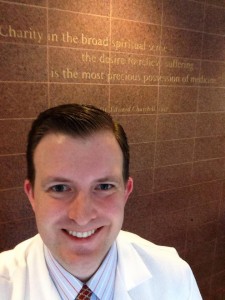William Kitchens
 The DuPont Challenge 1996
The DuPont Challenge 1996
Third Place, Senior Division
The Westminster Schools
Atlanta, GA
Essay Title: Microglia: The Brain’s Double-Edged Sword
Teacher: Andrea Allio Prybylski
What are you doing now?
I am finishing training in abdominal transplant surgery, and this July I will join the faculty of Emory University, where I will be an assistant professor of surgery at the medical school, a practicing liver transplant surgeon, and run a research lab in transplant immunology.
Where did you go to college and what was your major?
I went to Harvard University, where I majored in Biochemical Sciences. After graduation, I stayed in Boston to attend Harvard Medical School, and then pursued residency training in General Surgery at Massachusetts General Hospital. In the middle of residency, I took a research sabbatical and earned a Ph.D. in transplant immunology back home in Atlanta at Emory University.
Do you think taking The DuPont Challenge was a meaningful experience?
Being recognized by The DuPont Challenge was a very meaningful experience, and participating in it provided an excellent early foundation in communicating scientific principles to a lay audience. Serving as an effective communicator of scientific or medical knowledge is a vital skill that I have to employ almost daily, whether discussing a treatment plan with a patient and their family, or in writing a grant for a new research project.
Why would you say science education is important, and what role has it played in your life?
Science education has a profound impact on almost every facet of my postsecondary education and ultimate career. I love what I do–being able to employ my understanding of basic immunology and medical science to hopefully save lives and push forward the horizons of transplant research. STEM education is a national priority, as it will ensure the next generation of doctors, scientists, and engineers will be able to grapple with the challenges of tomorrow.
Do you have any advice for future participants?
You should aspire to captivate your reader, and the first step of achieving this is to select a topic that fascinates you. A compelling essay will inform your audience, and so your topic shouldn’t be something that has already been well published in the lay press (you are unlikely to shed new light on an overly broad or unoriginal topic that everyone knows something about already, like “The Internet” or “Genetic Engineering”). Good sources of inspiration including reading Popular Science or Scientific American; review articles in Nature or Science can also serve as helpful starting points. Strong scientific writing should avoid being overly “dry” or bogging down in details that detract from the underlying story. Finally, employ active voice and avoid “bland” language, but don’t succumb to the temptation of using a thesaurus on every word–you are crafting an essay, not a vocab quiz!
